Original Title: Presto Research: Understanding the Development History of Japan's Cryptocurrency Market
Author: Rick Maeda, Presto Research
Translation: Tao Zhu, Golden Finance
Abstract
- As the birthplace of two of the largest cryptocurrency exchange hacks in history, Japan's cryptocurrency history has been tumultuous.
- This has forced regulators to intervene earlier than in other countries, providing a clear regulatory framework for the industry sooner.
- However, strict regulations, coupled with high tax rates, have made Japan less competitive than neighboring countries such as Singapore and Hong Kong.
- In the face of sluggish sales and a lackluster domestic entrepreneurial environment, the challenges Japan faces in developing its Web3 industry are extensive, and revival will require meaningful policy changes.
Preface
Due to lackluster returns and a lack of vibrancy in the domestic stock market, Japanese retail investors have long been known for their interest in leveraged trading. The group of Japanese retail cryptocurrency traders is known for their influence on the volatile Turkish lira/yen forex pair, to the extent that the international financial community coined the term "Mrs. Watanabe" to represent them. When Bitcoin and other cryptocurrencies entered the retail domain in the early 2010s, Japanese day traders eagerly embraced this esoteric asset class. However, investors quickly faced domestic challenges, including the two most famous exchange hacks in cryptocurrency history, along with a relative lack of attractiveness from an entrepreneurial and investor perspective, weakening the country's relevance in the Web3 field.
In this research article, we (1) introduce the history of cryptocurrency in Japan, particularly in various regulatory developments, (2) take a look at Japan's current situation, and finally (3) explore several major participants in the domestic cryptocurrency industry.
History of Japan's Cryptocurrency Industry
Major events such as the Mt. Gox and Coincheck hacks have marked Japan's cryptocurrency journey, leading to the implementation of strict regulatory measures aimed at protecting investors and ensuring financial system stability. The country has continuously developed its regulatory framework to address new challenges and opportunities in the cryptocurrency field.
Early Rise of Mt. Gox
2009:
Bitcoin, the first cryptocurrency, was introduced by an unknown person or group under the name of Satoshi Nakamoto. In the early years, awareness and adoption were low in all regions, and this was no different in Japan, despite the creator using a Japanese pseudonym.
2011~2013:
Mt. Gox, a Bitcoin exchange headquartered in Tokyo, was the world's largest Bitcoin exchange at the time, handling the vast majority of Bitcoin transactions at its peak. (Figure 1).
Figure 1: Global CEX trading volume as of the end of 2013.
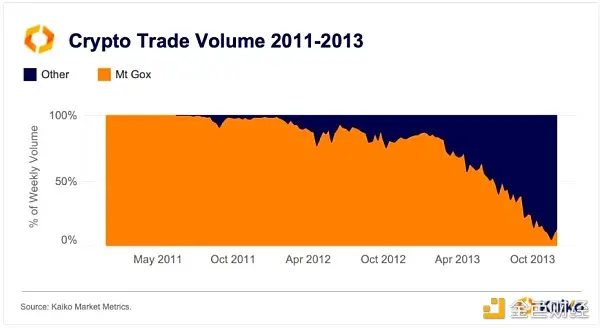
Mt. Gox Hack and Consequences
2014:
Mt. Gox suspended trading, shut down its website, and filed for bankruptcy, announcing that about 850,000 bitcoins were stolen due to security issues, accounting for nearly 7% of all bitcoins at the time, worth around $450 million (750,000 bitcoins belonging to customers and 100,000 of their own bitcoins). Investigations revealed that mismanagement and inadequate security measures led to the loss.
Figure 2: BTC fell by over 40% three days after Mt. Gox suspended withdrawals.
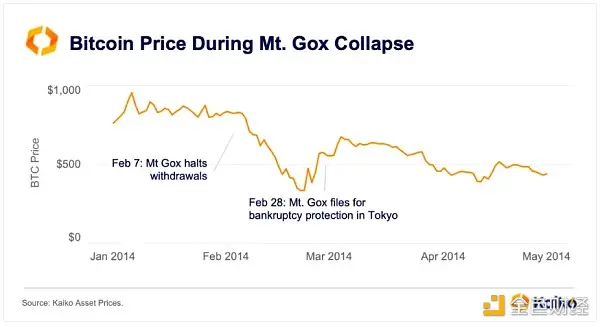
Regulatory Developments and Early Regulations
2015:
- The Financial Action Task Force (FATF), an intergovernmental policy-making body of the G7, issued guidelines recommending that countries regulate virtual currency exchanges to combat money laundering and terrorist financing.
- The Japanese government began drafting legislation to regulate exchanges to protect consumers and ensure financial stability.
2016:
- The Japanese Cabinet and Parliament passed amendments to the Payment Services Act (PSA) and the Financial Instruments and Exchange Act (FIEA). These amendments recognized cryptocurrencies ($BTC, $ETH, $XRP, $LTC, and $BCH) as a means of payment and imposed regulatory requirements on cryptocurrency exchanges, laying the groundwork for the comprehensive implementation of cryptocurrency regulations.
- The Financial Services Agency (FSA) was tasked with preparing for the implementation of these regulations, focusing on exchange registration requirements, network security measures, and anti-money laundering (AML) protocols.
Coincheck Hack and Strengthened Regulation
2017:
- The revised Payment Services Act came into effect in April, requiring cryptocurrency exchanges to register with the FSA and comply with AML and Know Your Customer (KYC) regulations. It also classified Bitcoin as a type of prepaid payment instrument.
- Bitcoin and cryptocurrencies became very popular in Japan, with many merchants, including Japan's largest electronics retailer Bic Camera, starting to accept Bitcoin as a payment method.
- The National Tax Agency (NTA) classified cryptocurrency income as "miscellaneous income," making it subject to taxation.
2018:
- Coincheck, one of Japan's largest cryptocurrency exchanges, was hacked, resulting in the theft of about 523 million NEM ($XEM) tokens, valued at around $530 million at the time. Coincheck eventually fully refunded its customers. This hack remains one of the largest cryptocurrency heists in history and prompted the FSA to adopt stricter regulatory measures. It was reported that the exchange stored $XEM in a hot wallet rather than a multi-signature wallet. In Figure 3, the chart below shows that $VIEW fell by over 76% in the first two months after the Coincheck hack. The first quarter of 2018 marked the brutal start of the bear market, but even when we eliminate the bear market impact by plotting $XEM/$BTC in the top chart, the currency pair still fell by over 61%.
Figure 3: Price movements surrounding the Coincheck hack.
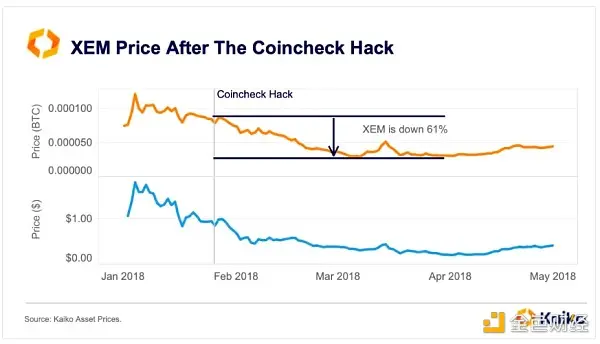
- Zaif, a smaller exchange, suffered losses of about $60 million in a hack.
- The Japan Virtual Currency Exchange Association (JVCEA) is a government-approved self-regulatory body aimed at raising industry standards and is responsible for approving tokens for listing on exchanges.
- The FSA issued business improvement orders to multiple cryptocurrency exchanges and conducted on-site inspections to ensure compliance with the new regulations.
- The FSA limited leverage for margin trading of cryptocurrencies to four times the deposit amount, aiming to curb speculative trading and protect investors.
Regulations on Margin Trading and Ongoing Developments
2019:
- Coincheck now complies with the new regulations and has resumed operations.
- The Japanese Cabinet approved new regulations, limiting leverage for margin trading of cryptocurrencies to 2-4 times the initial deposit.
- Amendments to the Financial Instruments and Exchange Act (FIEA) and the Payment Services Act (PSA) came into effect, further tightening regulations on cryptocurrency exchanges and security token offerings (STOs).
2020:
- The FSA reduced the maximum leverage for margin trading to 2 times.
- Further amendments to the PSA and FIEA were implemented, focusing on strengthening user protection and market integrity.
2021:
- Japan continues to develop its regulatory framework, focusing on strengthening investor protection, cybersecurity, and anti-money laundering.
- The FSA has established a new regulatory body to oversee cryptocurrency exchange operators and ensure compliance with evolving regulations.
- The FSA has required the JVCEA to implement self-regulatory rules regarding "cryptocurrency travel rules" for information sharing during transactions.
Recent Developments
2022:
- The FSA introduced additional guidelines for exchanges to custody digital assets, emphasizing the need for robust internal controls and risk management practices.
- The JVCEA introduced travel rules in its self-regulatory rules, while the Cabinet Secretariat modified the Act on Prevention of Transfer of Criminal Proceeds (APTCP) to enforce the rules.
- The National Tax Agency amended tax laws to exempt token issuers from paying corporate tax on unrealized cryptocurrency gains.
- Japan is exploring the possibility of issuing a central bank digital currency (CBDC), with the Bank of Japan conducting experiments and research.
- The Upper House passed a bill to regulate stablecoins, monitor money laundering, and combat illicit financial activities.
- The Liberal Democratic Party's Digital Society Promotion Headquarters released the "NFT White Paper: NFT Strategy for Japan's Web 3.0 Era," reflecting policy recommendations for NFT development and protection.
- The Ministry of Economy, Trade, and Industry (METI) established the Web3 Policy Office to create a supportive business environment for Web3-related industries.
- The FSA continues to lift the ban on foreign-issued stablecoins.
2023:
- The FSA continues to refine its regulatory approach, focusing on emerging trends such as DeFi and non-fungible tokens (NFTs).
- The FSA initiated a public consultation on a draft order to amend the Enforcement Order of the APTCP, clarifying the applicability of travel rules to Virtual Asset Service Providers (VASPs) in Japan.
- Prime Minister Fumio Kishida emphasized that Web3 is the pillar of economic reform, describing it as a "new form of capitalism" and highlighting its potential to drive growth by addressing societal issues.
2024:
- The JVCEA plans to streamline the listing process for digital currencies, aiming to simplify the approval process for existing tokens in the market.
- Lengthy pre-screening processes for certain digital assets by authorized exchanges are expected to be eliminated.
- The Cabinet approved a bill that may allow investment tools of venture capital companies to directly hold digital assets.
Japan's Efforts in Adopting Web3
Japan's weaknesses in Web3 adoption stem from regulatory constraints, particularly in exchange listings and taxation. Exchange listings are subject to strict regulation by the FSA, and local CEXs lack major tokens, leading to a lack of stablecoin liquidity in the market (Figure 4).
Figure 4: Limited product offerings by local CEXs. Note: We track USDT pairs on Binance and ByBit as both do not offer USD pairs. For ByBit, $SHIB and $BONK are offered in 1000-unit blocks ($1000BONK and $SHIB1000).
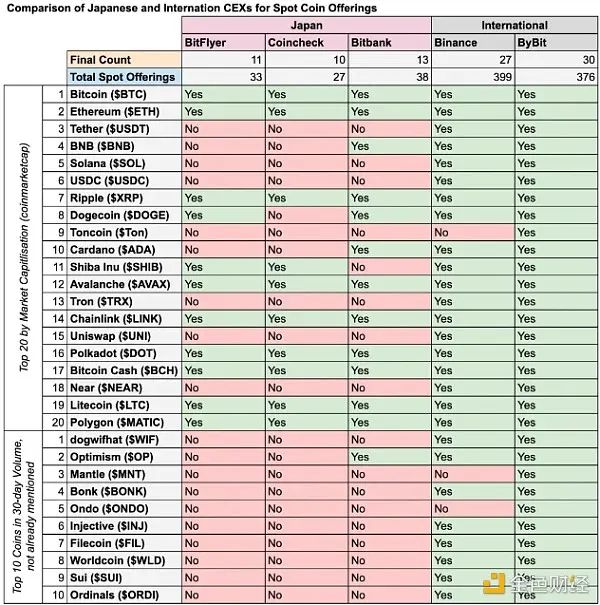
Apart from Bitbank, which has slightly higher token issuance in Japanese exchanges, this reinforces the dominance of major exchanges in the Japanese market (Figure 5):
Figure 5: Market share of trading volume for top 2 assets in Japanese and international top CEXs. Duration: 2024 to present.
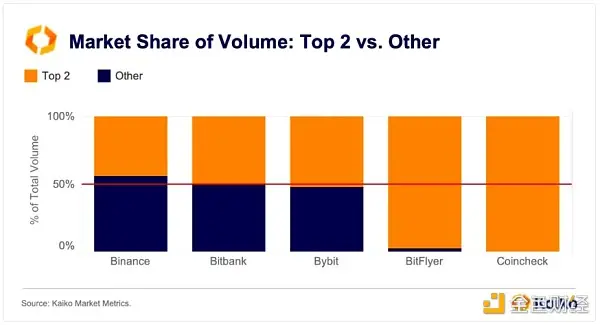
Meanwhile, cryptocurrency gains are treated as miscellaneous income and are subject to individual income tax rates, with the highest rate at 55% (Figure 6).
Figure 6: High capital gains tax levied on cryptocurrencies in Japan.
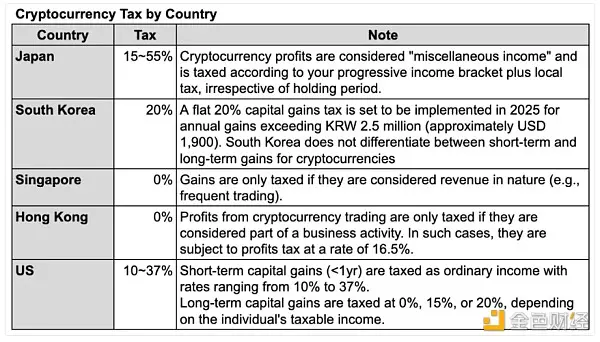
Institutionally, Japan is a country rich in content intellectual property, with companies like Sega and Kodansha, making it a preferred destination for NFT and gaming-driven projects. In theory, these companies bring attention, users, research capabilities, and capital— the issue is that these areas are effective in any country, and this has been hyped as Japan's bull market for years.
Politically, recent concerns about the ruling party's relaxation of regulations led to a setback in the April 2024 Lower House elections, giving momentum to the opposition Constitutional Democratic Party. However, given the continued majority of the Liberal Democratic Party in both houses of the Diet, and the increasingly fierce competition in international and domestic Web3 adoption, we believe the current developments are not worth noting.
Cryptocurrencies face many obstacles, but simply put, many issues are cultural and cannot be quantified with simple solutions. For a globalized city, low proficiency in English, a lack of entrepreneurial spirit, stable jobs at local major companies still being seen as the pinnacle of employment for graduates, and the inherently cautious nature of businesses being on par with the "fast action" of cryptocurrencies, among other challenges in taxation and CEX product supply, make it difficult to imagine a quick catch-up in adoption rates for Japan compared to its Asian neighbors.
Key Participants in Japan's Cryptocurrency Market
i) CEXs
As discussed in the previous section, domestic central exchanges in Japan have struggled to compete in product supply compared to their international counterparts, and high capital gains tax makes cryptocurrency trading less attractive. These challenges are reflected in the trading volumes of domestic exchanges, although this is observed outside of cryptocurrency exchanges, the UI/UX of these exchanges also lags behind foreign competitors.
Japan has 29 registered Virtual Asset Service Providers with the FSA, and we explore the current situation through the chart.
BitFlyer is the exchange with the largest trading volume, maintaining its dominance in recent years.
Figure 10: Market share of CEX trading volume in Japan.
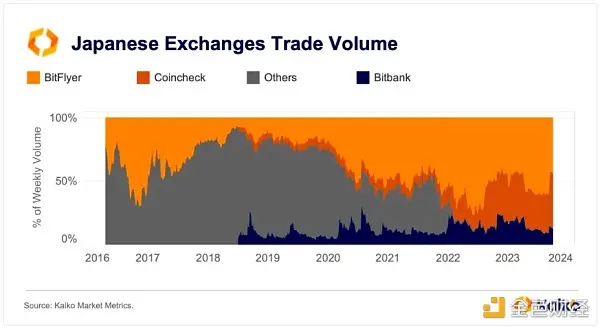
However, domestic exchanges in Japan have almost no competitive edge in trading volume compared to top international exchanges. Since the pandemic, Binance has left Japanese exchanges far behind.
Figure 11: Total spot trading volume comparison between Japanese exchanges and Binance.
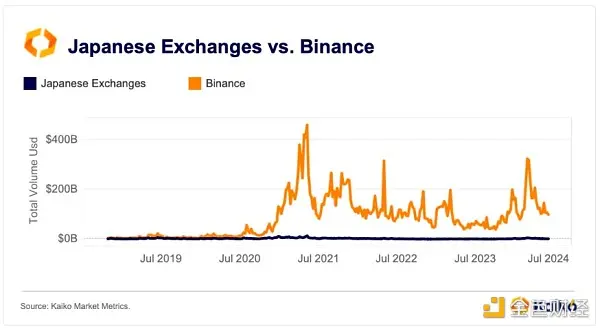
Similarly, the difference can be observed when comparing the depth of the order book for spot BTC trading between exchanges.
Figure 12: 1% depth of spot BTC order book comparison between Japanese exchanges and Binance.
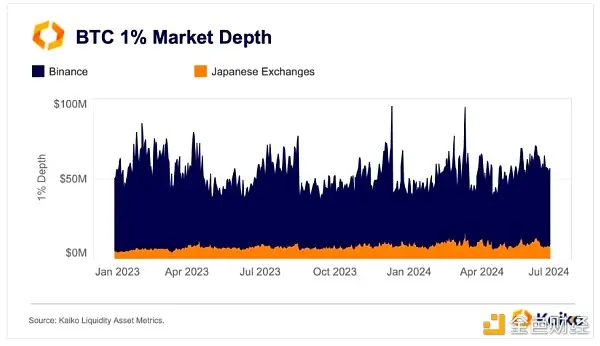
ii) Investment Groups:
SBI Digital
SBI Holdings (TYO: 8473) is a Tokyo-based financial services group founded in 1999. The company was initially part of the SoftBank Group and became independent in 2000. SBI Holdings operates in multiple areas, including financial services, asset management, and biotechnology. The company is known for integrating technology with traditional financial services to drive innovation and growth.
SBI offers a variety of traditional financial and crypto services through its subsidiary B2C2, including custody solutions and market-making.
iii) Protocols / Projects
Astar Network
Astar Network is a decentralized application (dApp) platform built on the Polkadot ecosystem and is one of the leading crypto projects in Japan (although its headquarters are known to be in Singapore, not Japan). It was founded by Sota Watanabe, a prominent figure in the Japanese blockchain space. Astar aims to provide developers with a scalable, interoperable, and decentralized network to deploy their applications. The network supports multiple virtual machines, including the Ethereum Virtual Machine (EVM) and WebAssembly (WASM), allowing developers to write smart contracts in various programming languages.
Astar holds significance in Japan as it represents one of the country's leading blockchain projects, showcasing the growing interest and investment in blockchain technology in the Japanese tech industry. However, perhaps representing Japan's interest in Web3, activity on Astar is still in its early stages: Figure 13 shows the Total Value Locked (TVL) of the chain in USD, while Figure 14 displays the TVL growth of its native token.
Figure 13: Astar TVL compared to major blockchains in USD.

Figure 14: Astar TVL compared to Solana TVL, measured in its native tokens ($ASTR and $SOL), re-based to 01Jan23=100.
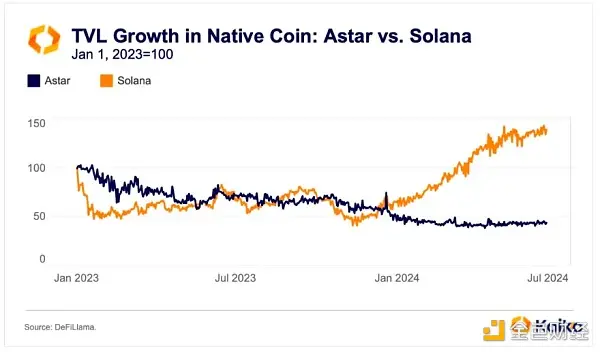
Summary
Despite leading in retail adoption, a combination of factors such as regulatory scrutiny following exchange hacks, high taxation, limited token offerings by exchanges, and cultural resistance has left Japan far behind in the Web3 space compared to other Asian countries. The current government under the leadership of Prime Minister Kishida of the Liberal Democratic Party has a long-term vision, but progress is slow. The struggles reflected in the activities of local exchanges make it difficult to see what catalyst could change the tide in Japan.
免责声明:本文章仅代表作者个人观点,不代表本平台的立场和观点。本文章仅供信息分享,不构成对任何人的任何投资建议。用户与作者之间的任何争议,与本平台无关。如网页中刊载的文章或图片涉及侵权,请提供相关的权利证明和身份证明发送邮件到support@aicoin.com,本平台相关工作人员将会进行核查。




